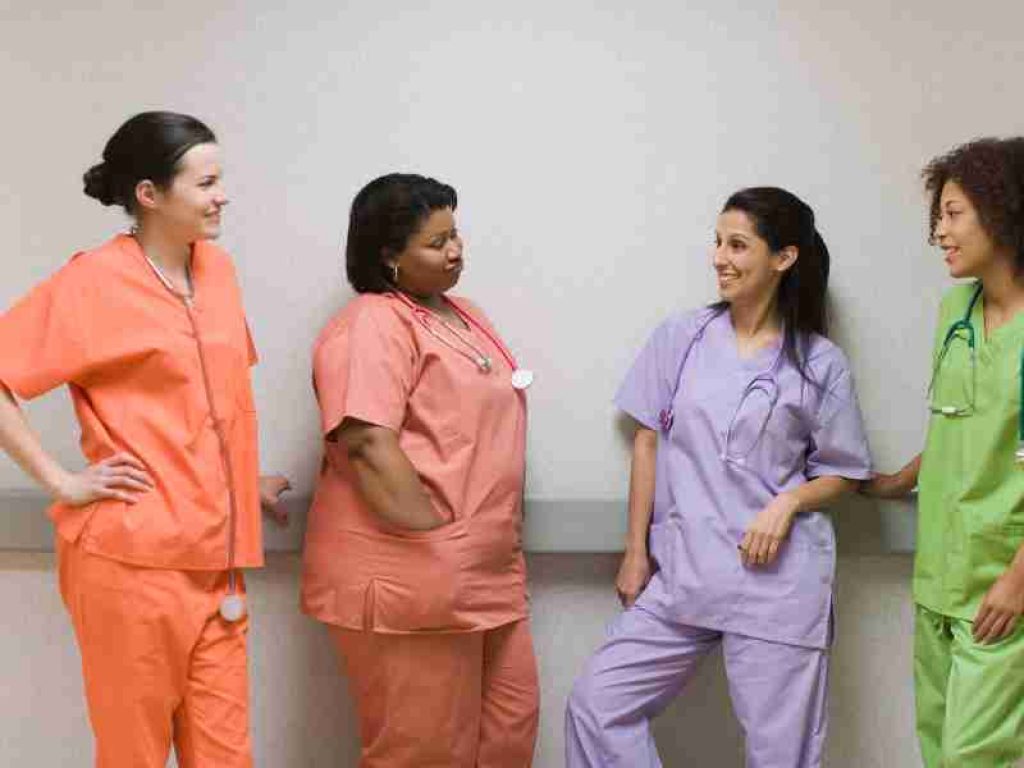
What Is A Parish Nurse?
A parish nurse’s responsibilities extend beyond medical treatment to include the community’s emotional, social, and spiritual well-being. Finding out what a parish nurse is and what it takes to become one might be helpful for those considering a career in nursing that incorporates faith into healthcare.
What Is a Parish Nurse?
A parish nurse, also known as a faith community nurse, is to provide medical attention to the congregation’s members. They prioritize the health screening of the people they serve by combining religious belief with medical practice.

The nursing specialty of faith community nursing originated in Chicago during the 1980s and was officially recognized by the American Nurses Association as a specialty in 1998. The scope and standards of practice for this specialization were outlined in the first publication around the same time.
What Does a Parish Nurse Do?
Parish nurses, known affectionately as faith-based healers, are guardians of holistic health that cater to the spiritual, physical and emotional well-being of individuals resonating within their faith communities.
This type of nurse is known by many different names depending on the religion or faith they serve, such as a crescent nurse (for those who care for Muslims), a Shabbat nurse (for those who care for Jews), a congregational nurse, or a church nurse. No matter what you call it, this branch of nursing recognizes the value of tending to a patient’s emotional well-being.
Patients may benefit from the parish nurse’s sharing of uplifting religious scripture, their prayers, and connections to local clergy members. People’s mindsets and physical health may benefit from meeting their spiritual needs.
Parish nurses care for people’s morale and educate them on health and social issues. A parish nurse may serve a single church or a larger group of churches. They frequently assist underprivileged neighborhoods. To hire a parish nurse, health systems occasionally collaborate with local denominations.
The healthcare system resources are made available to parish nurses in this way. In turn, the health system uses community-based, well-trained health workers in places like churches and community centers to assist persons in obtaining preventative treatment, decreasing their likelihood of being readmitted to hospitals, and bolstering broader efforts to promote health.
What are the Responsibilities of a Parish Nurse?
A parish nurse may or may not be responsible for specific tasks. However, some tasks are essential to this nursing specialty. Depending on their location, parish nurses commonly perform the following roles:
Health Counselors:
The role of the parish nurse is to offer guidance to the community on health matters. They might guide how to manage diabetes or other health screening issues. Also, they might pay house calls to older members of a faith community to assess their nutritional status, schedule follow-up medical appointments, or provide fall prevention advice.
Sources of Referrals:
Safe living conditions, regular jobs, and social support contribute to excellent health. A parish nurse’s job is to link those in need with the services available in their local churches and neighborhoods. For instance, parish nurses may connect clients with resources such as job placement services, mental health clinics, and low-income housing.
Parish nurses establish connections within congregations and the larger community and then draw on those connections to assist those in need. This could entail directing those needing free or low-cost services, such as food banks or dental clinics.
Facilitators:
Parish nurses rally volunteers to help individuals in need. When visiting the sick or elderly in private residences or medical facilities, individuals often seek assistance from members of their religious communities. Parish nurses often organize and lead support groups, worship services, and community events such as health fairs offering free healthcare screenings.
Health Educators:
In parish nursing, health education is essential. Community-based educators like parish nurses plan workshops on heart disease prevention and child development milestones. Experience a holistic care approach to health education by exploring the connection between faith, values, lifestyle and well-being. This unique perspective is reflected in their organization of health and wellness events at local churches, synagogues and schools.
Health Advocates:
Most people who parish nurses assist need access to basic social supports like health care. Parish nurses can be an invaluable resource when people need medical treatment but are overwhelmed by the system. Parish nurses work tirelessly to promote healthy living among their parishioners, engaging with them in both group and individual settings.
Furthermore, these inspiring advocates may also serve as voices for their congregation by taking part in community boards and ensuring that every member gets the social and health services they need.
How to Become a Parish Nurse?

The stages below outline what a prospective parish nurse would require in terms of education and experience.
Get a Bachelor’s Degree:
To become a parish nurse, you’ll typically need at least a BSN degree. But fear not, RNs with an associate’s degree can meet this requirement by enrolling in a specialized BSN program – and you’ll be saving souls in no time! The curriculum for this degree includes courses in everything from biology to psychology. Also, it gives students a chance to hone their nursing caregiving abilities.
Graduates can assess people’s health screening and analyze the various elements that impact that assessment. Health education, disease prevention, and promotion are major nursing curriculum focuses. For parish nurses, getting a Master of Science in Nursing (MSN) has become a popular choice. Although it is not mandatory for this profession, having an MSN can lead to better career prospects and higher earnings.
It is common for nurses who have worked in faith-based settings to go into parish nursing. A Master of Science in Spiritual Care degree will help them achieve their goals. Graduates of this program will be well-equipped to provide spiritual comfort to patients in medical facilities.
Become Certified as an RN:
Those interested in working as parish nurses need a Bachelor of Science in Nursing degree so that they can sit for the NCLEX-RN exam and become licensed. As a first step, they must achieve success on the National Council Licensure Test (NCLEX).
The exam assesses the candidate’s familiarity with fundamental nursing principles and procedures. To practice nursing legally, applicants must submit a license application to their home state and show proof of NCLEX passing score. Depending on the laws in your area, a background check may be necessary.
Get Real-World Experience:
To develop their abilities in health assessment, health teaching, and problem resolution, future parish nurses must have professional nursing experience. This usually necessitates at least two years of experience as an RN.
Those interested in becoming parish nurses should also read “Scope and Standards of Faith Community Nurse.” This guide, written by the American Nurses Association and the Health Ministries Association, provides parish nurses with an overview of nursing fundamentals and best practices.
How Skilled Is a Parish Nurse?
Aspiring parish nurses should use their time in the workforce to hone key nursing abilities, such as those listed below.

Communicative Abilities:
Church nurses must be patient, sympathetic, and empathetic to establish rapport and credibility with community members and decision-makers. They must also be trustworthy in order to build strong local connections and organize fruitful community health initiatives. A parish nurse’s ability to exude serenity is essential for her work with people experiencing significant stress.
Psychological Toughness:
Strong empathy and emotional fortitude are required to minister to people’s spiritual needs. Nurses working in parishes often have to see people in pain. Parish nurses may feel overwhelmed if they don’t learn to manage their emotions.
Those who work as parish nurses must develop the ability to draw on their inner fortitude and spiritual understanding to respond to their client’s needs with compassion without exhausting their reserves of these qualities.
Communication Skills:
Parish nurses must have strong verbal and written communication skills to explain medical conditions and treatments effectively and to field patient inquiries. The capacity to simplify complex concepts is equally important for health education.
To lead successful health programs, parish nurses must master the art of communication – from conversing with fellow healthcare professionals to listening actively to volunteers and leaders of faith communities. A skillful balance of attentive ear and silver tongue is key!
What are the Advantages of being a Parish Nurse?
- The option to work in places other than hospitals and clinics, such as places of worship, community centers, and patients’ homes.
- The specialty’s emphasis on one’s total health (emotional, psychological, social, and spiritual).
- Positions that allow you considerable leeway in providing client care without close supervision.
- Roles as an advocate, coordinator, counselor, and educator are just a few examples of the interesting and varied responsibilities that might be expected on the job.
- Gainful labor that contributes to people’s physical, mental, and spiritual health and well-being.
What are the Disadvantages of being a Parish Nurse?
- Nights, weekends, and long periods of standing and walking are all possible work schedules.
- The risk of receiving a salary that is lower than that of similarly qualified registered nurses.
- The lack of medicine administration and physical examinations, are two staples of traditional nursing practice.
- You may have to deal with anxious, angry, or disturbed customers, patients, and their loved ones.
Where Do Parish Nurses Work?
A parish nurse’s primary workplace is a church, but they may also work in schools, community centers, or hospitals. Hospitals are not just a place for medical treatment, and they’re also sanctuaries with serene chapels and compassionate chaplains that offer spiritual care. Faith-based nursing make up a subset of hospitals. Independently, they can minister to the spiritual needs of their congregation’s adherents.
How much Does a Parish Nurse Make?
Becoming a parish nurse is a choice motivated less by financial gain than by a desire to serve people. They can visit different places to bring spiritual comfort to those who need it most (the patients and their loved ones). Some people decide to go on missions so that they might help others on a spiritual level all across the world.
Parish nurses earn an average annual salary of $15,000 per year. Parish nurses can expect to make anywhere from $20,000 to $60,000 annually. Almost 35% of parish nurses receive payment for their work. It’s very uncommon for parish nurses to also work full-time at hospitals or other medical facilities. Still, they devote some of their time to serving the local community this way. They do an incredible service for which there is no reasonable monetary exchange.
What is the Career Outlook for Parish Nurses?
There is a growing need for trained nurses. Opportunities for experienced nurses in the coming decade look excellent. The growing demand for parish nursing is partly attributed to the large elderly population. When people get older, they often rediscover their religious upbringings, and parish nurses are well-positioned to offer them the spiritual solace they need.
In addition to the medical treatment they are already receiving, many elderly individuals seek support from their local churches. Positions in parish nursing allow nurses to be there for patients at a critical juncture in their lives.
Parish nurses who can tend to the spiritual needs of the terminally ill are in high demand. It takes a particular kind of person to become a parish nurse, but those who do often find themselves amid exciting social and cultural exchanges worldwide.
FAQ’s
What’s the job of a parish nurse?
Parish nurses rally volunteers to help individuals in need. To help the sick and aged, they frequently enlist the help of members of the local religious community. Moreover, they organize health fairs where people can get checked out for free.
Why is parish so important?
Simply put, the parish is the church’s physical location. A parish is a community of believers, doers, and dreamers. These are the places where the good news of Jesus Christ is shared, where followers of Christ are developed, and from which they are sent to reshape the world. In our Church, parishes serve as the beating heart of the local Christian community.
What is the best way to explain parish?
The local Christian community of a parish is led by a single pastor and centered on a single church. Churchgoing is only one aspect of parish life. Sunday morning coffee and donuts are just one of the many community events and gatherings they plan. A parish is a geographical unit.
What purpose do Christians see in parish nursing?
To that end, parish nurses in the United Kingdom health minister and wholeness to their communities by addressing their clients’ needs across four dimensions: the physical, the emotional, the social, and the spiritual.







